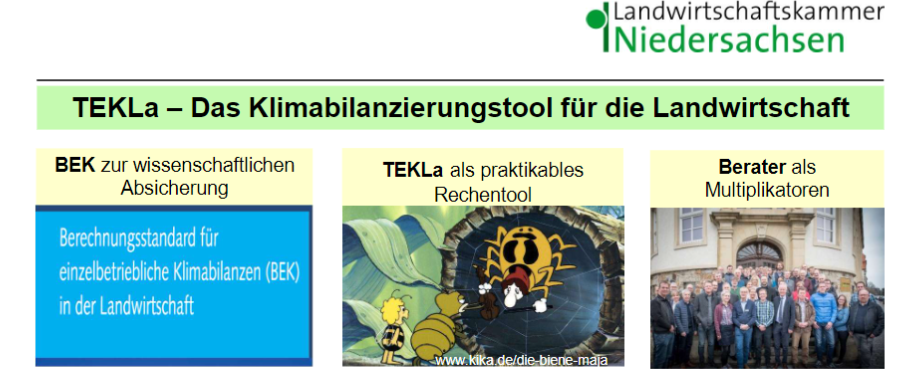General
For climate protection advice in the agricultural sector, a working group at LWK Nds developed a calculation tool over several years. Farmers can now obtain this advice from the LWK. On average, TEKLa enables a farm to save 50 tons of CO2 per year. The special thing is that only data is required that must be available on the farms due to their recording obligation. Customers such as dairies and slaughterhouses will be more in demand for a carbon footprint for products produced. BDI and BMU awarded this calculation tool with the German Innovation Prize for Climate and Environment 2020.

This excellent tool gives the farmers the opportunity to request individual advice and to receive a certificate with which they can demonstrate the climate protection for their farm. The following balance sheets (financial year WJ) are required for the fingerprint calculation:
1. Milk production test (moving average at the end of the WY)
2. Forage examination (for WY 2019/20, cultivation 2019)
3. Comparison of nutrients or calculation of fertilizer requirements (excess nitrogen, yield?)
4. Concentrate delivery notes (amount, energy content, soy content)
5. Electricity bill (close to WJ period)
Benefits
- spans a network between the scientific and practical requirements for a climate balance.
- shows where the company stands in terms of climate protection compared to other companies and how it can improve the CO2 footprint of its products.
- provides valid facts for the media, politics and business and thus anticipates unrealistic requirements.
Various organizations (in Germany) that already calculate individual climate footprints for agriculture have agreed on a common standard. The so-called calculation standard for individual company climate footprints (BEK) will be published on the KTBL website in the middle of the year. BEK provides individual farm recommendations for climate-friendly agriculture on a solid basis.
Impact
- Socio- economic resilience: you need complete documents and annual balance sheets for the calculation and advice.
- Animal health and welfare:
- Production efficiency and meat quality:
- Environmental sustainability: the farmer can prove his CO2 balance or his CO2 savings.
Link to website (in German)